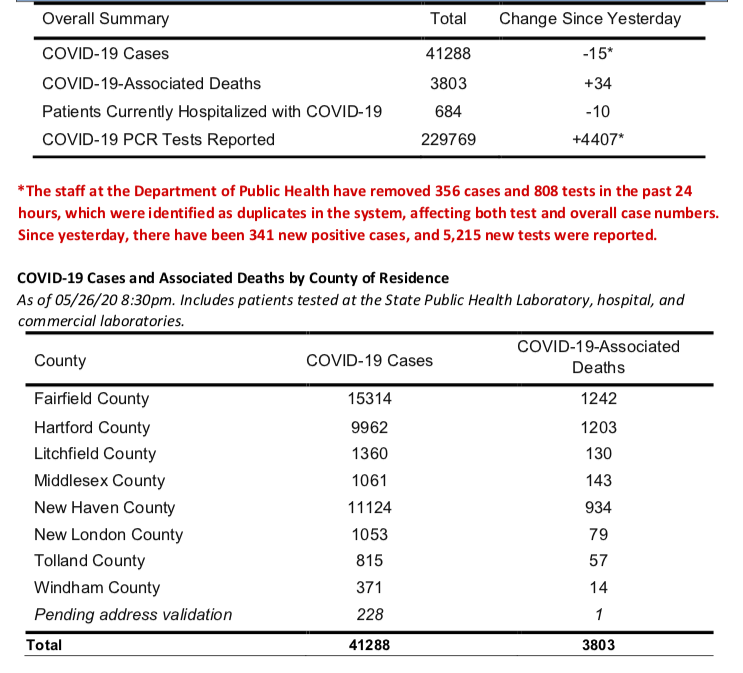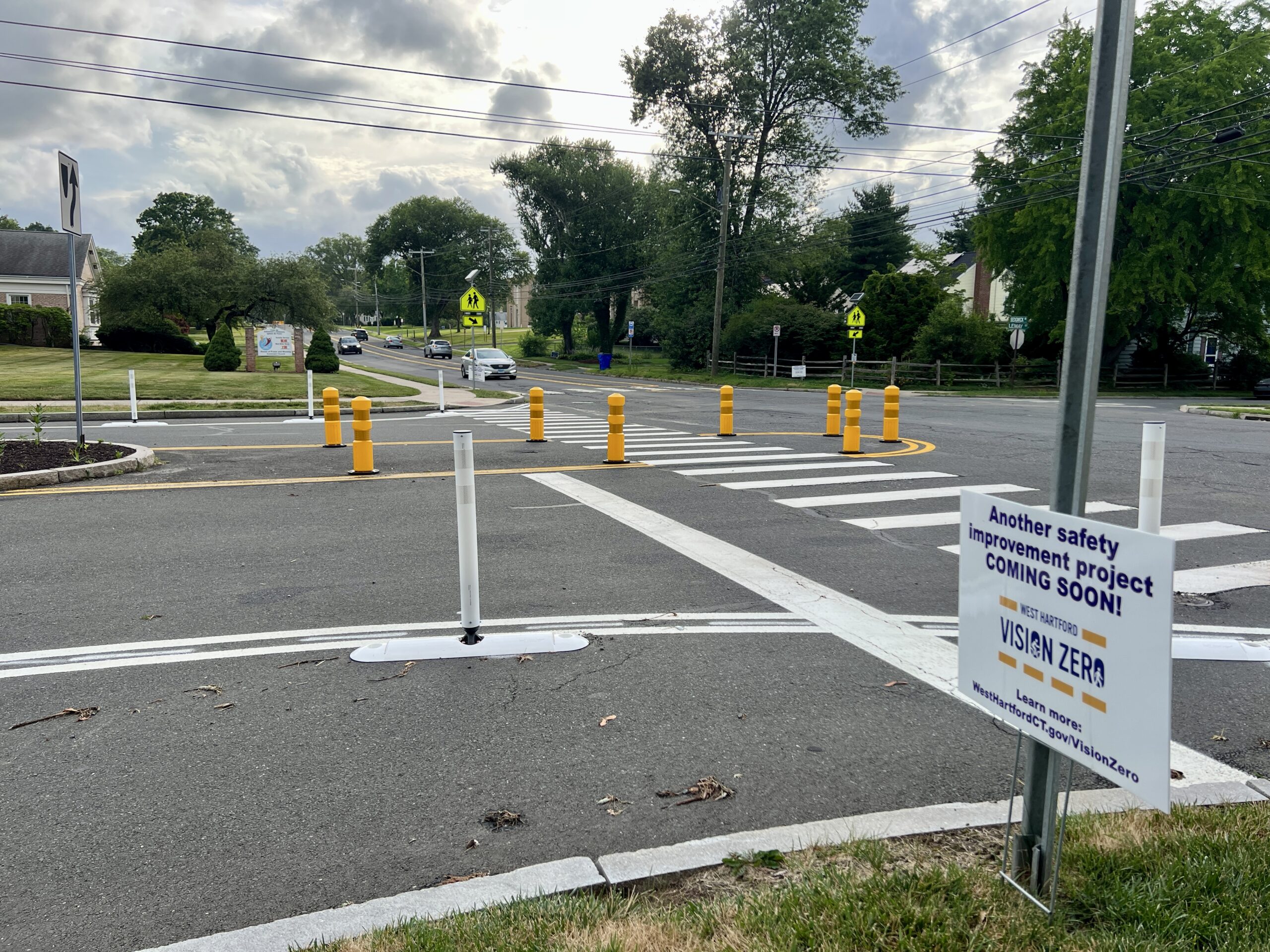Lamont Challenged after Seventh Inmate Dies from Coronavirus

Audio By Carbonatix

Barbara Fair, of West Haven, asks Gov. Ned Lamont to explain the lack of testing in the state’s prisons after an eighth inmate reportedly died of COVID-19. Lamont held a press conference on the New Haven Green Wednesday where a walk-up COVID-19 testing site was set up for the day. Fair is with the prison activist group Stop Solitary CT to end the practice of solitary confinement. Photo credit: Cloe Poisson, CTMirror.org
An additional 34 people died from the disease Wednesday, while hospitalizations continued their decline.
By Gregory B. Hladky, Kelan Lyons, and Mark Pazniokas, CTMirror.org
West Hartford-specific information provided by Ronni Newton, We-Ha.com
A prison-rights advocate confronted Gov. Ned Lamont at an outdoor press conference Wednesday, accusing the governor of indifference to the health of prison inmates during the COVID-19 pandemic, not long after the Department of Correction announced that a seventh inmate has died from the disease.
Lamont tried to explain the administration’s efforts to contain the disease in prison, including the testing of all inmates. Barbara Fair of West Haven, who has written opinion columns and demonstrated on prison issues such as solitary confinement, immediately interrupted.
“But people are still dying, and you could have released some of those people, but you decided you didn’t want to do that,” Fair said, shouting to the governor during a news conference at a COVID testing site on the New Haven Green. “Now, what I’d like to know is why are those lives disposable, that you don’t even have a plan to release?”
The governor began again, and Fair interrupted.
“Are you indifferent to the lives of incarcerated people, and that’s why you are allowing them to die?” Fair said.
‘I think just the opposite, ma’am,” Lamont replied. “We’re doing everything we can. We have to keep those people safe, and that’s what we’re doing.”
The latest inmate to die of the disease is a 60-year-old man who had been incarcerated at Osborn Correctional Institution, a prison placed on lockdown two weeks ago after 105 asymptomatic inmates tested positive for the virus. The man, who was not identified due to medical privacy rules, had been serving a 43-year sentence for murder.
He would have been released by September 2023 but died Tuesday at the UConn Health Center, where he was taken on April 30.
“I was hopeful that we would not experience another death due to the coronavirus,” said Correction Commissioner Rollin Cook. “We will keep working to prevent any more. My condolences go out to his family and loved ones.”
The department has finished the mass testing of inmates at Osborn and Corrigan-Radgowski Correctional Center. Nearly 300 of the 1,579 tested at each of the two correctional facilities were asymptomatic, positive cases of COVID-19 – much lower than the number of asymptomatic cases discovered in prisons and jails in Ohio and Pennsylvania after mass testing. However, hundreds of Connecticut inmates declined to be tested.
According to an email sent by Director of External Affairs Karen Martucci to a family member with an incarcerated loved one, officials tested 617 individuals in custody at Osborn, about 58% of the prison’s population. Roughly 440 inmates opted out of testing; 146 were found to be asymptomatic. Those who declined testing were separated from those who were tested positive and negative for the virus.
The department tested all 962 inmates at Corrigan-Radgowski. More than 150 were found to be asymptomatic. “We credit the increase in compliance rate to the collaborative efforts of custody and health services to educate the population on the virus and the benefits of being testing,” said Andrius Banevicius, public information officer. “To date, only one offender – from all those that recently tested positive – has developed symptoms associated with the novel coronavirus.”
Almost 800 inmates have tested positive for the virus since the pandemic began, 514 of whom have recovered.
COVID-19 deaths in Connecticut top 3,800
The number of coronavirus-related fatalities in Connecticut hit at least 3,803, according to the state’s latest report Wednesday on the impact of the pandemic, an increase of 34 from the previous day’s total. Hospitalizations continued their gradual decline, with a net reduction of 10 patients, bringing the number of COVID-19 patients in the state’s hospitals to 684.
State officials also corrected earlier published statistics on the number of tests for the virus performed and the number of COVID-19 positive cases discovered, saying earlier numbers included tests and positive cases that were duplicates. The revisions removed 808 tests and 356 cases that were listed in previous reports.
The latest report shows that 5,215 coronavirus tests were performed since Tuesday and 341 positive new cases were found.
West Hartford’s total number of positive cases remained 580 based on data reported Wednesday, but it’s not known if any of the duplicates removed involved town residents. There was one additional reported death in West Hartford on Wednesday, for a total of 103.

St. Vincent’s first COVID-19 patient survived after 35 days of care
Back in March, as the COVID-19 pandemic began to hit Connecticut with force, the doctors and nurses at St. Vincent’s Medical Center in Bridgeport were expecting the virus would be sending them the very elderly and frail.
“Nobody really talked about young people at that time,” Susan Skoog, nursing director of critical care and cardiology at St. Vincent’s, said Wednesday. The information they had at the time – which remains true today – was that seniors were most at risk, Skoog said,
So when 21-year-old Rodney Davis of Bridgeport arrived as their very first coronavirus patient, “It came as a little bit of a shock,” Skoog recalled.
Davis went on to spend 35 days in various levels of care at the hospital, from being on a ventilator with a breathing tube, to weeks of drugs to keep him asleep, to rehabilitation, and finally to walking out of St. Vincent’s to cheers and applause.
“We pulled out all of our bag of tricks,” Skoog said at a video news conference with Davis. It took about three weeks of intensive care before the hospital’s staff could be confident that Davis would survive.
“It was a testament to his resilience and his determination to live,” Skoog said.
Davis said he actually remembers very little from that long medical battle. “I only remember the first day, to be honest,” Davis said. He said it was a shock when he finally woke up and realized how many days had passed.
But he does recall walking down that crowded hospital corridor with doctors, nurses and other staff cheering for him and taking his mom in his arms for a huge hug.
“It was amazing,” Davis said. “I’m blessed.”
Hartford Archidiocese to allow weekday masses to resume with restrictions
Parishes in the Archdiocese of Hartford will be able to celebrate public weekday masses, conduct weddings, baptisms and funerals starting on June 8, under strict guidelines issued by the Archdiocese Wednesday.
No more than 50 people will be allowed at any given weekday mass, and Sunday masses will not resume until a date to be announced later, according to officials of the Archdiocese.
Gov. Ned Lamont’s administration has not ordered churches, synagogues, mosques, and other religious institutions to be closed as a result of the pandemic but many of those have voluntarily closed their doors to protect the public.
The 50-person limit for religious gatherings in Connecticut is part of the administration’s response to the COVID-19 crisis.
“While many churches can accommodate a congregation of 50 socially-distanced people, those churches that cannot will have to limit participation accordingly,” Archdiocese officials said in a statement accompanying the guidelines.
Anyone attending masses or other religious functions will also have to maintain 6-foot social distancing rules, bring hand sanitizers, and wear masks, except for children and people with legitimate health reasons not to wear masks.
The guidelines also recommend that elderly people and those with health conditions that might put them at additional risk from the virus should stay home even after June 8.
A pandemic-related ban on confessions is also being ended by the Archdiocese, but confessions will not be allowed in traditional confessionals and will only happen at the discretion of the local pastor. Pastors will designate alternate spaces where social distancing can be maintained during confessions.
Connecticut nursing homes getting some federal PPE
Thirteen nursing homes in Connecticut are getting additional personal protective equipment as part of a federal program to ship eye protection, masks, gowns and gloves to long-term care facilities around the U.S.
The intent of the program, which is being coordinated by the Federal Emergency Management Agency, is to provide an additional 14 days of PPE supplies to more than 15,000 nursing homes.
According to the federal delivery schedule, all 13 Connecticut nursing homes were to have received their allotments by this week.
At the start of the pandemic, personal protective equipment was in short supply at many Connecticut long-term care facilities and state officials said this state was receiving relatively little in the way of PPE supplies from federal reserves.
Nursing homes in this state and across the nation have been a major concern as the coronavirus continues to take a deadly toll of frail and elderly residents.
Reprinted with permission of The Connecticut Mirror. The authors can be reached at [email protected] and [email protected].
Like what you see here? Click here to subscribe to We-Ha’s newsletter so you’ll always be in the know about what’s happening in West Hartford! Click the blue button below to become a supporter of We-Ha.com and our efforts to continue producing quality journalism.



